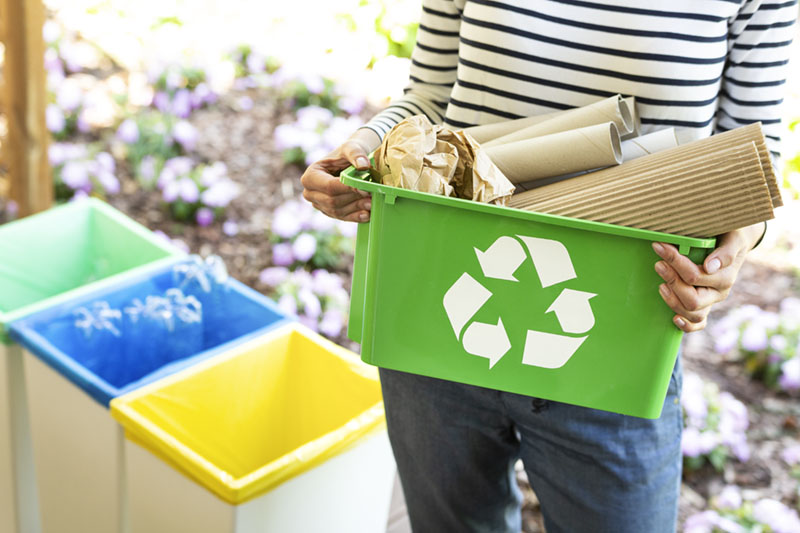Here at Tamborasi, our mission is to provide you with easy changes anyone can take to be more environmentally friendly in their day to day life. We’re firm believers that small changes do make a big impact, especially when more and people begin to make them.
So for this article, we’re highlighting 14 easy ways to be more environmentally friendly and help the planet, one step at a time. Some of these may be familiar, and others might provide some new ideas for you!
1. Transportation
Even with more people working from home than ever, many of us still need to leave our homes on a regular basis.
If you are one of these people, you can still help the environment by rethinking how you use transportation. To be more conscious of the environment, people worldwide are switching from using their cars to biking.
If you’re within walking distance, you can also consider a relaxing walk to work which can be really relaxing and less physically intensive. If you absolutely must drive, consider starting a carpool among you and your nearby coworkers to reduce your carbon footprint.
2. Avoid Plastic When You Can
You may already be aware that plastic is a well-known enemy of the environment.
Plastic is one of the most dominant issues in terms of pollution, and much of our waste plastic ends up in landfills and the ocean (even if it is put in recycling). Once plastic items are in the sea, they can cause harm and even fatal injuries to sea life.
Even worse, the chemicals used in plastic products are resistant to breaking down. As a result, plastic is essentially non-biodegradable and will remain on the Earth for many lifetimes.
Luckily, many companies are making the switch from plastic to biodegradable or recycled material. Lately, you can opt-out of using plastic for a similar substitute for almost any product.
A common trend has been using metal straws and water bottles instead of the single-use plastic ones you find in restaurants. If you forget your straw, you can always opt for no straw.
3. Shop Local
Shopping locally is a great way to reduce your carbon emissions.
When you shop at a farmer’s market, for example, you are supporting a small business and reducing wasted packaging on processed foods. When you shop at a family-owned store in your town, you are also reducing the amount of wasted packaging.
However, as some small businesses have paused, your options locally may be limited. But you don’t have to just shop for things to help the environment. Many community gardens are practicing social distancing for volunteers to continue to grow their own food.
4. Start Your Own Garden
If you don’t have access to local community gardens, you can start your own!
Growing food in your garden is a reasonably cheap and productive way to help the environment. When you grow your own food, you reduce wasted food, shipping emissions, and packaging.
Many people like to garden because it is a project that takes time and care. Gardening is also a great way to spend more time outside as well as eat more healthy, unprocessed food.
Gardening can also allow you to start your compost pile as well. Composting can reduce your carbon footprint and eliminate the need for chemical fertilizer. Composting is easy to do and keep up with.
5. Properly Store Your Food
One of the biggest reasons people throw food away is that it has gone bad before they get a chance to eat it.
When many of us store our food, we often don’t keep it correctly, leading the food to go bad quickly. Consider refrigeration and airtight containers if you don’t do so already. Another reason food tends to go bad is that people simply just forget about it if it’s in the back of the fridge or cabinet, or when an individual or household buys too much food.
Overbuying food or not properly planning shopping lists can also lead to an abundance of wasted produce. Next time you have to go grocery shopping, plan your meals ahead of time or buy less than usual if you’re often having to dispose of your food.
6. Take Shorter Showers
Water is another commonly wasted resource among households.
The average household can waste up to 180 gallons of water in a single week. That weekly number totals up to 9,400 gallons of water a year.
Water waste frequently happens through taking long showers, leaving the water on while brushing your teeth, and doing excessive amounts of laundry.
While taking a long shower can be an enjoyable way to unwind, they waste more water than you think they might. To avoid unnecessary water waste, shorten your showers’ length and allow yourself only the time that you need to wash your body and hair.
7. Recycle
Recycling is among the most popular ways to be environmentally conscious.
The recycling process can be very informative, and there are many different ways you can recycle. Many homes, businesses, and restaurants have an independent bin for throwing away recyclable products. But there are more fun and productive ways that you can recycle.


Many people like to recycle by turning old materials into a craft project. You can recycle old clothes and materials to brighten up your wardrobe or decorate your home. If you are crafty enough, you can even turn recycled material into a functional object.
Composting is also a form of recycling, as most compost piles use old food and material that would typically be thrown away.
You can also turn recycling into a game with your family to see who can develop the most creative ways to recycle.
8. Change the Way You Use Electricity
Wasting electricity is not only bad for the environment but can be expensive for you as well.
Coal is the primary resource that generates electricity, which causes damage to our atmosphere. The way that coal is heated up to generate electricity causes the coal to release carbon emissions. Carbon emissions are part of what causes the greenhouse effect.
But cut down your electricity usage is surprisingly easy once you know what to do. While society’s problem with wasting electricity does not fall solely on any one person, there are things that you can do at home to do your part in reducing your carbon footprint.
One of the simplest things that you can do is to change what kind of lightbulb you use. Using an LED light bulb is an environmentally safe option that can even be easier on the eyes.
Adding insulation to your home is another excellent way to reduce wasted energy, as you are less likely to need to use your heater if your house is well-insulated.
There are a lot of options for using solar-powered technology as well. There are many portable chargers for phones and other electronics that obtain their energy from the sun.
9. Use Less Paper
Paper is made from trees, and trees play a significant role in the environment.
If you live in a household that uses a lot of paper, there are plenty of alternatives to everyday household items. You can swap paper towels for cheap dish rags or reusable paper towels, and invest in whiteboards instead of drawing paper. If you must use paper products regularly, keep an eye out for recycled paper options.
However, the issue of using paper runs deeper than the fact that the process kills trees. In any instance of mass deforestation, the loss of trees can cause a host of issues to the environment around it.
Deforestation can cause soil erosion, as well as flooding. Greenhouse gases will arise from the use of heavy machinery used to cut down trees. Aside from those effects, many animals and people lose their homes as a result of deforestation.
10. Eat Less Meat
You may be unaware that the meat industry creates many harmful greenhouse gases and takes up space and resources that could otherwise be used to grow vegetation. Not only is the meat industry incredibly damaging to the environment, but the industry has a bad reputation for being inhumane to its livestock.
There are many debates on the morality of either choosing to eat meat or going vegetarian/vegan. While no one should be forced into vegetarianism or veganism, there are many environmental and ethical benefits of reducing how much meat you consume.
Eating less meat (red meat in particular) can have a positive impact on your health as well. While some people cannot afford to go strictly plant-based for health or monetary reasons, there are also many low-cost options available for those who choose to stop or cut back on eating meat. Beans, legumes, and high-protein grains are great cheap options to get started with.
11. Go On a Low or No-Buy Year
There has been a rising trend in people taking a low-buy year to reduce waste and fight consumerism.
A no-buy year is a process of reducing your shopping to the bare minimum for a year to save money and reduce waste. A low-buy is very similar to a no-buy, except the person participating in the low-buy will allow themselves a small amount of shopping.
With countless ads and commercials in our face 24/7, it can sometimes feel strange when you don’t buy something during the day. But because society encourages needless spending, many people end up buying hundreds of things that they don’t need throughout the year.
The total of unnecessary purchases throughout the year can end up being an embarrassing amount. But you can break this cycle by sitting down either by yourself or with your family and create a budget for everything you need.
Once you have an idea of what you need, you can choose to stick to the necessities, or you can set a limit for how much extra spending you plan on doing.
12. Hold a Garage Sale (In-Person or Online)
Garage sales are a common way to make money in the warmer months. Many people participate in their neighborhood garage sales as a summer tradition. But did you know, holding a garage sale can also have a positive impact on the environment?
Garage sales prices tend to be much cheaper than retail prices, opening up opportunities for more people to gather clothes and other necessities. Garage sales also reduce the waste of buying new clothes.
If having a standard garage sale is not an option, you can turn to social media and online platforms to host a virtual garage sale for your neighbors.
13. Plant a Tree
As mentioned earlier, trees play a vital part in keeping the environment healthy.
If you already enjoy gardening and taking care of plant life, consider planting a tree in your yard. While you most likely won’t be able to plant a forest in your backyard, even having one or two new trees can improve your yard’s overall appearance and environment.
Trees provide shade, as well as homes for wildlife. If you want to attract birds to your tree once it has grown, you can build a birdhouse to accompany the tree.
14. Volunteer to Clean Up Litter
Cleaning up litter around your town in your spare time is a great and fulfilling way to keep your local area clean and safe.
Cleaning up local litter can also build a sense of community among your town members and help you find a great way to get outside.
In Conclusion
We hope these ideas inspired you to try a few different ways to help you be more environmentally friendly!
Of course, there are hundreds of other ways that you can become more environmentally conscious, no matter how small they are. Just choosing to be more aware of the impact we leave on the Earth can leave us all feeling better about the world around us and provide some hope for the future.














